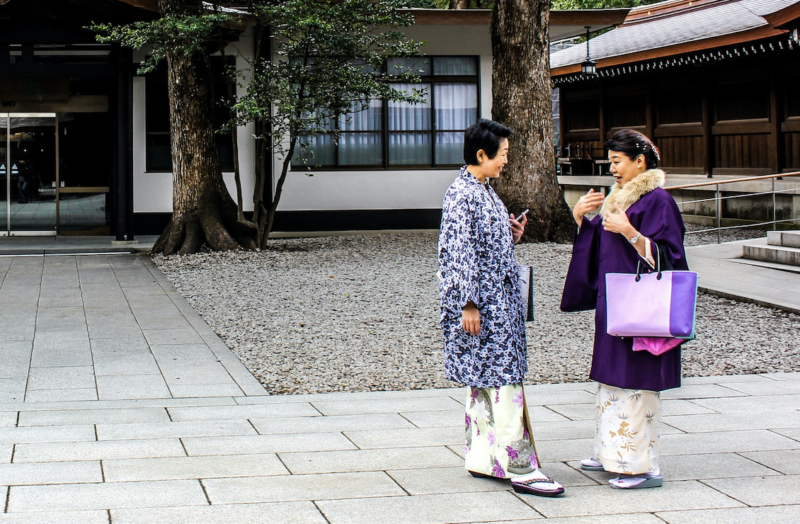The Best Japanese Pronunciation Guide
Japanese sounds beautiful. But still, recreating Japanese pronunciation seems daunting to learners. Luckily, mastering Japanese pronunciation is easy with the right tools. This guide can let you in on the secrets of how the Japanese pronounce words, so you can easily sound like a local in Japan.
Tricks to Master Japanese Pronunciation
Knowing how to speak Japanese is more than just pronouncing the words right. You need to know how the language works, and how the culture influences it. Once you know these, you’re ready to speak Japanese.
The trick is to use the most useful tools to learn how to speak Japanese. This guide can show you how to master the pronunciation with Japanese-specific tricks, and it also includes general language learning advice that will make your studies a lot faster and easier.
1. Start With the Japanese Alphabet
The first step of learning Japanese is mastering its alphabet. Well, all its alphabets. The Japanese writing system uses three different scripts: hiragana, katakana, and kanji.
Kanji is borrowed from Chinese, and each character conveys a specific meaning. But, hiragana and katakana are both phonetic Japanese alphabets. This means, that each character reflects how you pronounce it in Japanese.
Focusing on hiragana and katakana first will surely help you master Japanese pronunciation.

2. Avoid the Use of Pronouns
Unlike English, Japanese doesn’t always use pronouns. Of course, there are certain situations where you have to use them, such as emphasis or clarification. But, in everyday conversational Japanese, you need to learn to drop pronouns. Look at this example in a Japanese translation:
- Example 1
- English: I’m very hungry. Can you take me for lunch?
- Japanese: Stomach is empty. Do lunch, okay?
- Example 2
- English: Are you planning to go to the shop? Can you please get me a cup of coffee?
- Japanese: Shop going to? Can please buy coffee for me?
From the above examples, it is clear that the Japanese almost completely avoided the use of pronouns when the subject was present. No unnecessary use of pronouns when the subject is clearly known by both parties.
3. Feel Free to Interrupt Your Japanese Conversation Partner
When you’re speaking English, interrupting someone is very rude. But, in Japanese, it’s completely normal and natural. If your Japanese conversation partner interrupts you, don’t be offended. And feel free to return the favor.
Regular interruptions during a conversation are accepted. It doesn’t just show that you’re paying attention. You can also advance the topic and bring up new ideas to discuss.
This is just one of those culture-specific unwritten rules that you need to know to master Japanese pronunciation.
4. Use Grunts to Practice Aizuchi
Following on from the tradition to interrupt your partner during a conversation, the Japanese have mastered this cultural norm. You can easily “interrupt” the person you’re talking to by using specific grunts.
This practice is called aizuchi. They’re short but frequent interjections to let your conversation partner know that you’re paying attention. They have the same meaning as “uh-huh”, “I see”, “oh really?”, and “right”. To truly sound like a local, you need to use aizuchi.

5. Use Simple, Casual, and Short Sentences
There’s no need to form long and complex sequences in Japanese. As a language, Japanese is very to-the-point and precise. This is how the locals speak it. So, why should you do it any differently?
6. Japanese Gender and Intonation
Another cultural cue you have to follow is based on biological gender. Traditionally, intonation in pronouncing Japanese words and phrases differs between men and women. Although there’s no pressure on you to abide by this, you can notice it in the way Japanese locals talk.
7. Throw in Some Japanese Slang
Conversational Japanese uses a lot of slang. A lot of these are Japanese, but you may recognize some from English too.
When you’re learning Japanese, it’s best to learn formal and polite expressions. Showing respect is extremely important in Japanese culture. You wouldn’t want to offend someone older or of higher status than you.
But, as a foreign language learner, there’s less pressure on you. If you’re speaking with friends and people younger than you, it’s ok to use informal phrases. And slang is highly recommended.
8. Don’t Waste Time, Start Speaking Japanese ASAP
So many language learners are afraid of speaking their target language. But, don’t let your fear or shyness limit your Japanese studies. Start speaking Japanese from your first lesson onwards.
The only way to reach fluency is by speaking the language. You can’t expect a perfect Japanese pronunciation without ever opening your mouth. So, the sooner you start, the sooner you’ll achieve an amazing Japanese accent. Don’t waste time, focus on speaking Japanese.
9. Record Your Japanese Pronunciation
If you don’t have a teacher or Japanese roommate to correct you, you’ll have to do it yourself. Chances are, when you start speaking Japanese at first, your pronunciation won’t be the best. You’ll need to find a way to correct yourself.
The best way to do that is to record your Japanese pronunciation, and listen to it back. You can notice which words and sounds you need to work on to sound more like Japanese locals.
10. Don’t Worry About Your Japanese Accent
You’re learning a foreign language. And not just any language. Japanese is a relatively hard language, or at least its reputation says so. No Japanese local will call you out on your Japanese pronunciation. Your accent won’t be an issue. So, don’t let your inhibitions stop you from speaking Japanese.
Fluency is much more valuable than having the right accent. And the more you practice, the better feel you’ll get for the authentic Japanese accent.

11. Practice Your Japanese Pronunciation Every Day
Of course, having the right Japanese pronunciation ultimately comes down to practice. We cannot stress this enough. The more you practice, the more confident you’ll be. And then you’ll definitely achieve Japanese fluency.
You don’t need to practice hours on end. But, a little bit every day goes a long way. Even 20 minutes out of your busy schedule can already benefit you immensely.
12. Use an App that Makes You Speak Japanese
Of course, you can start reading Japanese and singing any day. But, if you also want to learn useful Japanese vocabulary while practicing your pronunciation, downloading an app is the simplest way to do that. And the best app that gives you that is OptiLingo.
OptiLingo has built-in Japanese pronunciation guides. You’ll hear everyday Japanese so your vocabulary grows quickly. But, this app also makes you repeat these word and phrases. So, it builds your Japanese accent and pronunciation from the first lesson onwards. To achieve Japanese fluency easily download OptiLingo!







